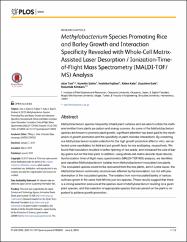| dc.contributor.author | Tani, Akio | |
| dc.contributor.author | Şahin, Nurettin | |
| dc.contributor.author | Fujitani, Yoshiko | |
| dc.contributor.author | Kato, Akiko | |
| dc.contributor.author | Sato, Kazuhiro | |
| dc.contributor.author | Kimbara, Kazuhide | |
| dc.date.accessioned | 2020-11-20T15:05:27Z | |
| dc.date.available | 2020-11-20T15:05:27Z | |
| dc.date.issued | 2015 | |
| dc.identifier.issn | 1932-6203 | |
| dc.identifier.uri | https://doi.org/10.1371/journal.pone.0129509 | |
| dc.identifier.uri | https://hdl.handle.net/20.500.12809/3018 | |
| dc.description | WOS: 000355955300133 | en_US |
| dc.description | PubMed ID: 26053875 | en_US |
| dc.description.abstract | Methylobacterium species frequently inhabit plant surfaces and are able to utilize the methanol emitted from plants as carbon and energy sources. As some of the Methylobacterium species are known to promote plant growth, significant attention has been paid to the mechanism of growth promotion and the specificity of plant-microbe interactions. By screening our Methylobacterium isolate collection for the high growth promotion effect in vitro, we selected some candidates for field and pot growth tests for rice and barley, respectively. We found that inoculation resulted in better ripening of rice seeds, and increased the size of barley grains but not the total yield. In addition, using whole-cell matrix-assister laser desorption/ionization-time-of-flight mass spectrometry (MALDI-TOF/MS) analysis, we identified and classified Methylobacterium isolates from Methylobacterium-inoculated rice plants. The inoculated species could not be recovered from the rice plants, and in some cases, the Methylobacterium community structure was affected by the inoculation, but not with predomination of the inoculated species. The isolates from non-inoculated barley of various cultivars grown in the same field fell into just two species. These results suggest that there is a strong selection pressure at the species level of Methylobacterium residing on a given plant species, and that selection of | en_US |
| dc.description.sponsorship | Japan Science and Technology AgencyJapan Science & Technology Agency (JST) [12-024]; Ryobi Teien Memorial FoundationRyobi Teien Memory Foundation; Japan Society for the Promotion of ScienceMinistry of Education, Culture, Sports, Science and Technology, Japan (MEXT)Japan Society for the Promotion of Science [23688012]; Grants-in-Aid for Scientific ResearchMinistry of Education, Culture, Sports, Science and Technology, Japan (MEXT)Japan Society for the Promotion of ScienceGrants-in-Aid for Scientific Research (KAKENHI) [15H04476] Funding Source: KAKEN | en_US |
| dc.description.sponsorship | This work was supported by the Japan Science and Technology Agency, Innovative Seeds Grant, grant number 12-024 (http://www.jst.go.jp/chiiki/seeds/); Research Award from the Ryobi Teien Memorial Foundation (http://www.ryobi.gr.jp/teienzaidan/) (no grant number is available); and Grants-in-Aid for Scientific Research, Japan Society for the Promotion of Science, grant number 23688012 (http://www.jsps.go.jp/j-grantsinaid/). The funders had no role in study design, data collection and analysis, decision to publish, or preparation of the manuscript. | en_US |
| dc.item-language.iso | eng | en_US |
| dc.publisher | Public Library Science | en_US |
| dc.item-rights | info:eu-repo/semantics/openAccess | en_US |
| dc.subject | Methylobacterium species | en_US |
| dc.title | Methylobacterium Species Promoting Rice and Barley Growth and Interaction Specificity Revealed with Whole-Cell Matrix-Assisted Laser Desorption/Ionization-Time-of-Flight Mass Spectrometry (MALDI-TOF/MS) Analysis | en_US |
| dc.item-type | article | en_US |
| dc.contributor.department | MÜ, Eğitim Fakültesi, Matematik Ve Fen Bilimleri Eğitimi Bölümü | en_US |
| dc.contributor.institutionauthor | Şahin, Nurettin | |
| dc.identifier.doi | 10.1371/journal.pone.0129509 | |
| dc.identifier.volume | 10 | en_US |
| dc.identifier.issue | 6 | en_US |
| dc.relation.journal | Plos One | en_US |
| dc.relation.publicationcategory | Makale - Uluslararası Hakemli Dergi - Kurum Öğretim Elemanı | en_US |


















